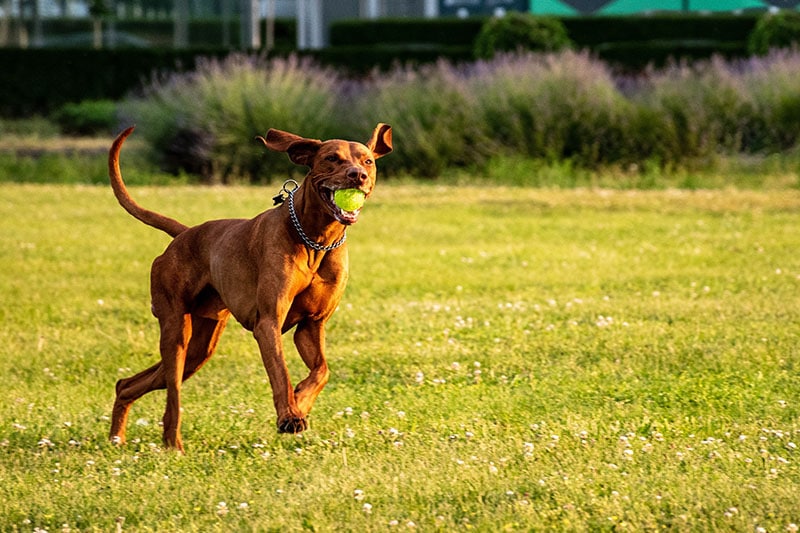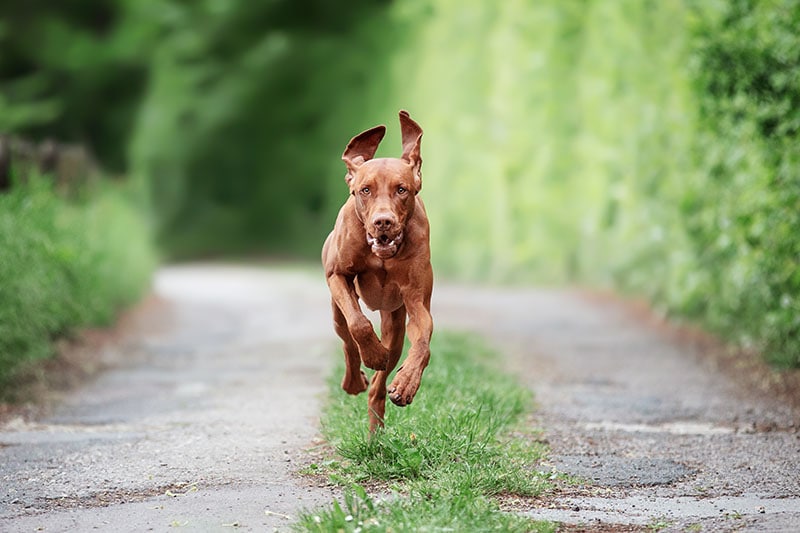When you’re thinking about adding a dog to your family, finding the breed that will be the right fit is essential. Two of the most critical factors in a new companion are their temperament and energy level.
If you’ve been considering a Vizsla, one question likely comes to mind: how much exercise do they need? Vizslas are highly energetic dogs thatrequire about 2 hours of exercise daily.
Keep reading as we discuss what the Vizsla is like as a pet and offer a few ideas for keeping up with their exercise requirements.
The History of the Vizsla
Understanding the Vizsla’s history can give you a better picture of their care needs and temperament. The ancestors of the Vizsla were bred by Magyar warriors in ancient Hungary. The Magyar were interested in breeding agility and swiftness into both their hunting dogs and horses. These ancestor dogs were able to keep up with the warrior’s horses and were a reddish color, like the modern Vizsla.
Over time, the dogs were refined by Hungarian nobles and warlords and were used for hunting birds and hares. They were bred as retrievers and pointers and became the Vizslas that we are familiar with today.
The first Vizsla was brought to the United States in 1950, and eventually, the American Kennel Club recognized them in 1960. In 2024, the Vizsla is the 35th most popular breed out of 284 dog breeds.

The Exercise Needs of the Vizsla
Vizslas were bred to be as fast as horses, or at least, their ancestors were. This should tell you how energetic they are and that they will require a great deal of exercise. They were bred to work with warriors and hunters and could walk and run long distances over challenging terrain.
Vizslas have been clocked running at 40 mph (64 kph), so they have plenty of energy! They require a minimum of 1 hour of exercise every day, but they really need 2 hours overall. A chunk of this time should be off-leash running time.
If you are active and outdoorsy, the Vizsla might be a great companion for hiking, biking, running, and swimming. Remember that only adult Vizslas should be exercised vigorously; puppies shouldn’t be overexercised because they are not fully grown yet. It’s common for young dogs to injure their joints and bones with too much exercise.
When dogs become seniors, they are more prone to conditions like arthritis and start to slow down, so they will also need less exercise.
Different Kinds of Exercise for the Vizsla
Walking
All dogs need about two walks a day. They provide an outlet to expend energy, socialize, and explore the world around them.
You should walk Vizslas for about 45 minutes twice a day; try to build a routine and walk them at the same times every day.
Take your Vizsla to off-leash areas to let them run, but teach them to come on command so they don’t run off. If that isn’t possible right away (or at least until you’ve trained them), you can use a retractable leash.

Playtime
Playing with your dog will give your Vizsla physical and mental exercise and plenty of bonding time.
- Tug-of-war: Most dogs love to play tug-of-war with their humans. It is also a strength-building exercise.
- Fetch: Even an ordinary game of fetch is an excellent way to get your Vizsla running full-on.
- Frisbee: This one can be tricky to teach, but Vizslas are intelligent dogs and love chasing and catching a Frisbee.
- Swimming: Vizslas have webbed feet and have Retriever in their background, so they’ll love to go swimming with you.
- Socializing: Vizslas get along well with other dogs, so giving them a chance to run and play at a dog park (off-leash would be ideal) gives them playtime and exercise.
Mental Stimulation
Mental stimulation is just as essential as physical exercise. Without it, a Vizsla will get bored, which leads to destructive behavior.
- Scent-and-nose games: Dogs bred to hunt can do well with scent-and-nose games. They enable dogs to engage their hunting instincts and give them physical and mental exercise.
- Puzzle toys: They are designed to keep dogs busy and engage their problem-solving skills. Keep in mind that Vizslas are quite intelligent, so you might want to get challenging puzzles. You can also make your own.
- Chew toys: Most dogs love to chew, and you can provide your Vizsla with durable chew toys and treats. Chew toys exercise their jaws and help clean their teeth. Chewing also releases endorphins and keeps them busy.
- Food toys: Try constructing a few food puzzles and turn your dog’s mealtimes into a game. Working for their food gives them mental and physical exercise.
- Enrichment: The dog’s environment should contain enough interesting and engaging outlets. This includes puzzle toys, but you should also ensure that they have a comfortable bed and crate with soft blankets.
Fitting Your Vizsla’s Exercise Needs Into Your Day
If you are busy most days, there are a few ways to fit all this exercise into your schedule.
Every day must include walks and mental stimulation. So, starting in the morning, take your Vizsla for a 30-minute walk and have a play session at the closest dog park. When you get home after work, enjoy another walk for at least 30 minutes and include a game of fetch.
If you work from home, aim for a 60-minute walk in the morning. If you’re lucky enough to live near a hiking trail, a hike with your Vizsla would be ideal. After work, play scent work games with your dog for 30 minutes.
On your days off, you can go hiking, take them swimming, or visit the beach! You can also consider hiring a dog walker to take your dog out halfway through the day.

Conclusion
If you’re not active and don’t particularly enjoy long walks and hikes, you might want to look for a quieter and calmer breed. The Vizsla is ideal for people who want to go for long walks and enjoy the outdoors with a running companion.
All dogs need walks, but the Vizsla needs someone to wear them every day. So, if you’re looking for an energetic companion that’s super smart, loving, and has a zest for life, the Vizsla might be perfect for you!
- Related Read: How to Potty Train a Vizsla
Featured Image Credit: Bianca Pinkernell, Shutterstock











